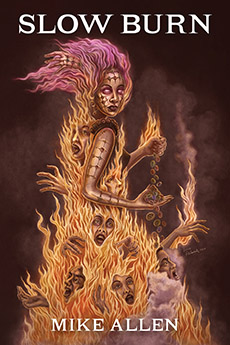Featured Story • August 2013
Hexagon
Alexandra Seidel
1 Recognition
Scheherazade feels heat blushing her cheeks but with the rain falling heavy and thick and the steel gray sky overhead, the color seems just background noise. She forgot her umbrella, and now she stands on the sidewalk, naked to the rain. All her clothes melt to her skin, and she feels like drowning. Across from her, she sees the man who makes everyone else turn into inconsequential extras, who is like a lighthouse banishing reef and rock from her mind. Shahrayar, she thinks, I know you.
Shahrayar turns, and he stops. They are each caught in the stillness of a snow globe, the world around them turmoil, but between them time stretched paper thin.
Scheherazade thinks of a night—just one single night—broken into a thousand pieces. She realizes her throat has been a knot for a long time, but now, it is finally free, unobstructed.
“Once upon a time, there was a girl who knew the name of all she saw from the moment she saw it . . .” she says, her words barely a whisper.
But Shahrayar hears her.
2 Premonition
Baba hums an ancient melody as she measures the flour, the sugar, as she breaks the eggs. Scheherazade is cleaning and peeling apples at the table, the girl’s dark curls running down over her red sweater, a scarlet scarf around her throat. The scarf blends with the color of apple peels in the bowl in the girl’s lap.
There has not been a day when Baba has known her grandchild to be that silent and without a tale to tell. The old woman’s melody pushes to minors. Not a day with this forlorn look on her face, not a day when she was here, but wasn’t.
“Once upon a time, there was a girl who would visit her grandmother each and every day, sheathed in a scarf that the grandmother had made for her, a scarf she had made only for her,” Baba whispers, melody forgotten.
She takes another egg, cracks it, and lets the contents drop in the mixing bowl only to discover that it’s all bloody inside. The cake is ruined, she thinks, her wrinkles deepening.
At the table, Scheherazade utters a short screech. The girl has cut herself with the kitchen knife, three drops falling from her finger and on the peeled white apples.
Ruined, Baba thinks.
3 Suspicion
Selene runs a hand over her belly, a habit already though it is still early. Shahrayar reads the paper across from her, but his eyes are not moving with the words. The mug of coffee in front of him has grown cold.
Inside her, something twists.
“Once upon a time, there was a girl, and all around her, there was glass,” Selene whispers.
Her eyes on fire she rises, knocking over the cold coffee. The dark brown liquid spills over the table, over Shahrayar’s white shirt, and she knows that it will stain. He has dropped the newspaper, stares at her wide-eyed as if he had forgotten she was even there to begin with.
“Look at me, Shahrayar!” she says, one hand on her belly. But his eyes are marbles of glass, as if a coffin lid had been shut over them.
Shahrayar no longer sees her, she realizes.
4 Rubicon
Behind the receptionist’s desk, Binnoire is busy tuning her guitar. She used to play the harp once, but harps are so sad, and she has found that the sadness of a guitar is lighter, easier for her to bear.
The couple approaches her desk shyly, yet not uneager. The girl’s hair and eyes are dark with the ink of generations of stories, and her skin vibrates bronze to match. The man is bearded, hair growing wild as if it were looking for the moon.
“Once upon a time, there was a girl who got lost in the woods, her ankles bitten by wolves, her eyes blinded by thorns from the enchantress’s garden,” Binnoire whispers.
She rents them a room for the hour, shrugs as they enter the elevator. Nothing anyone can do, she thinks and picks up her guitar again. Today, her fingers stain and ache as she coaxes a melody from the old strings that is dark and heavy and sad.
5 Retrospection
Vera’s eyes know the truth already, but her mind struggles to catch up. It is the curse of younger siblings, always struggling to catch up. Scheherazade’s lifeless body lies somewhere under that train. Please let it be whole. Please please please.
The other woman had approached them as they waited for the train. Her eyes had been an afrit’s, hot and mad with anger, and she had held her belly wracked with cramps. While they waited, that afrit-eyed woman had ambushed them, demanded to talk to Zadie. We’ll just talk at the other end of the platform, Zadie had said. I’ll be right back . . .
“Once upon a time, there were two sisters, the one fair as snow, the other dark as pitch . . .” Vera whispers to herself as her mind catches up and the tears flow from her. The darkness and the screams come later.
6 Observation
Sepho never judges. The body on her table is that of a girl, blond hair like moonbeams. She was perhaps four months pregnant when she took the pills. Sepho can see it in the rounder forms, the softer edges of the hips and breasts. Cremation, the husband said. Quiet, the husband said, uncrying. Sepho knows of the murder of course, everybody knows, news of that kind travel so far and fast. The colleague who handled the other body, the body of the girl who was pushed, said there was nothing to be done, the damage too great. Eyes popped out, skull cracked, limps torn loose and scattered. Nothing to be done.
Sepho looks down at her charge. Nothing to be done, she thinks.
“Once upon a time, there were two sisters who thought they had fallen in love with a true prince,” Sepho says quietly as she tries to straighten the body’s hand that is angled strangely upward, as if to reach for the abdomen.
Sepho works quietly, precisely. There are so many stories, she often thinks to herself.
And Sepho knows the ending of them all.
 Alexandra Seidel probably caught the myth and fairy tale bug while she was out in the woods one midsummer day. Meanwhile, the disease has turned her into a poet, writer, and editor. Her work may be found in Strange Horizons, Goblin Fruit, Stone Telling, and elsewhere. You can follow her on Twitter (@Alexa_Seidel) or read her blog: tigerinthematchstickbox.blogspot.com.
Alexandra Seidel probably caught the myth and fairy tale bug while she was out in the woods one midsummer day. Meanwhile, the disease has turned her into a poet, writer, and editor. Her work may be found in Strange Horizons, Goblin Fruit, Stone Telling, and elsewhere. You can follow her on Twitter (@Alexa_Seidel) or read her blog: tigerinthematchstickbox.blogspot.com.
She says that “Hexagon” is “a little bit like the monster made from body parts of different corpses, sown together where the edges fit. Nothing in here is really new, but I was hoping to take a closer look at all those female characters that run through our best-loved fairy tales and myths like red ink, hopefully to allow readers to gain a fresh view or some insight here and there.”
![]()
If you’ve enjoyed what you’ve read, please consider pitching in to keep us going. Your donation goes toward future content.
![]()















